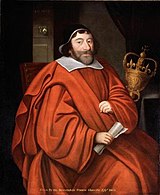Short Parliament

TheShort Parliamentwas aParliament of Englandthat was summoned byKing Charles I of Englandon 20 February 1640 and sat from 13 April to 5 May 1640.[1]It was so called because of its short session of only three weeks.
After 11 years ofpersonal rulebetween 1629 and 1640, and on the advice of theEarl of Strafford,Charles recalled Parliament to obtain money to finance his military struggle withScotlandin theBishops' Wars.[2]However, like itspredecessors,the new parliament had more interest in redressing grievances than in voting the King funds for his war against the ScottishCovenanters.
John Pym,MP forTavistock,quickly emerged as a major figure in debate; his long speech on 17 April expressed the refusal of theHouse of Commonsto vote subsidies unless royal abuses were addressed.John Hampden,in contrast, was persuasive in private: he sat on nine committees. A flood of petitions concerning royal abuses were coming up to Parliament from the country. Charles's attempted offer to cease the levying ofship moneydid not impress the House.
Annoyed with the resumption of debate on Crown privilege and the violation of parliamentary privilege by the arrest of the nine members in 1629, and unnerved about an upcoming scheduled debate on the deteriorating situation in Scotland, Charles dissolved Parliament on 5 May 1640, after only three weeks' sitting. In August 1640, a Scots Covenanter army invaded and occupied parts of northern England. Thetruce which followedcompelled the King to call another parliament which he could not dissolve. This became known as theLong Parliament.
See also[edit]
References[edit]
- ^Sir John Borough (1869).Notes of the Treaty Carried on at Ripon Between King Charles I. and the Covenanters of Scotland, A.D. 1640, Taken by Sir John Borough, Garter King of Arms.Camden Society. p. 8.
- ^Royle, Trevor (2010).Civil War: the wars of the three kingdoms; 1638-1660(Paperback ed., Repr ed.). London: Abacus. p. 102.ISBN978-0-349-11564-1.

